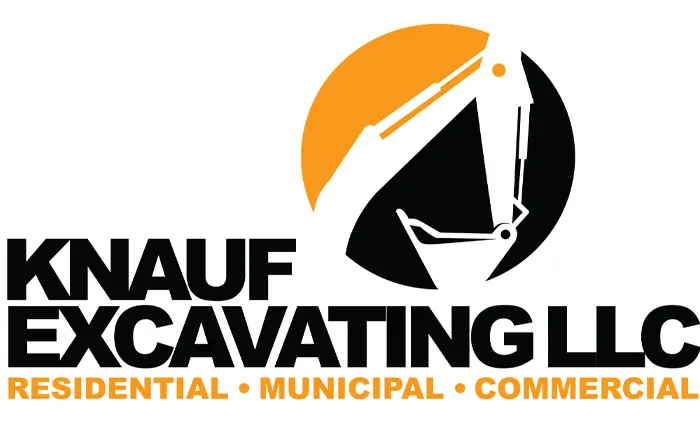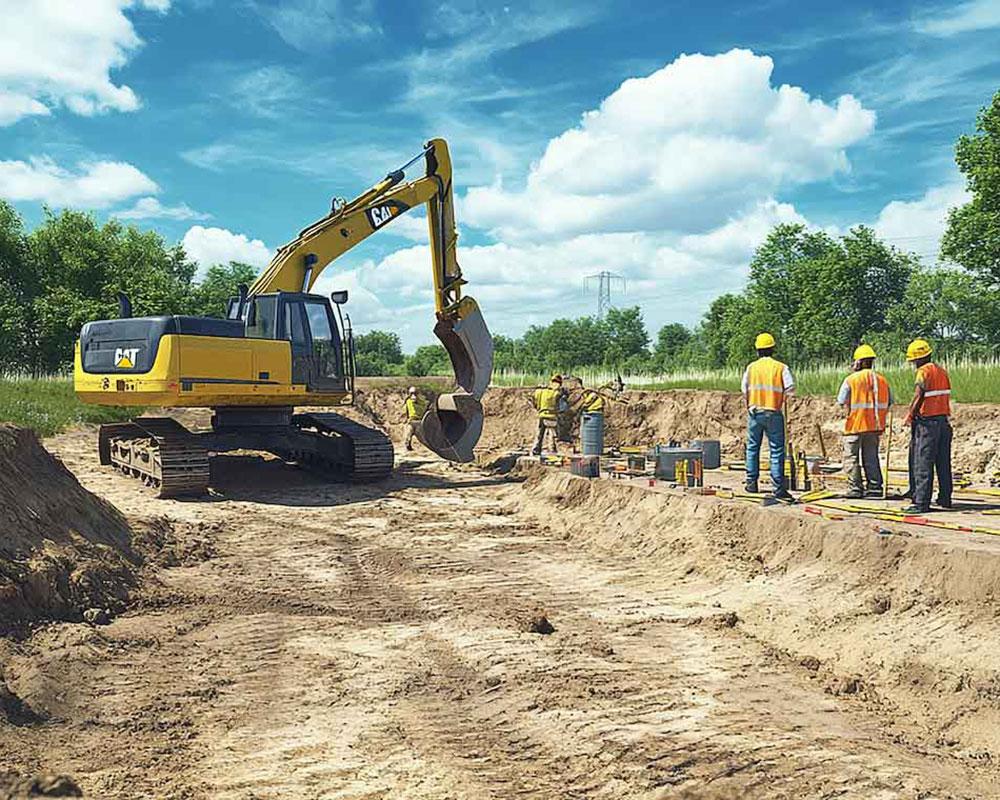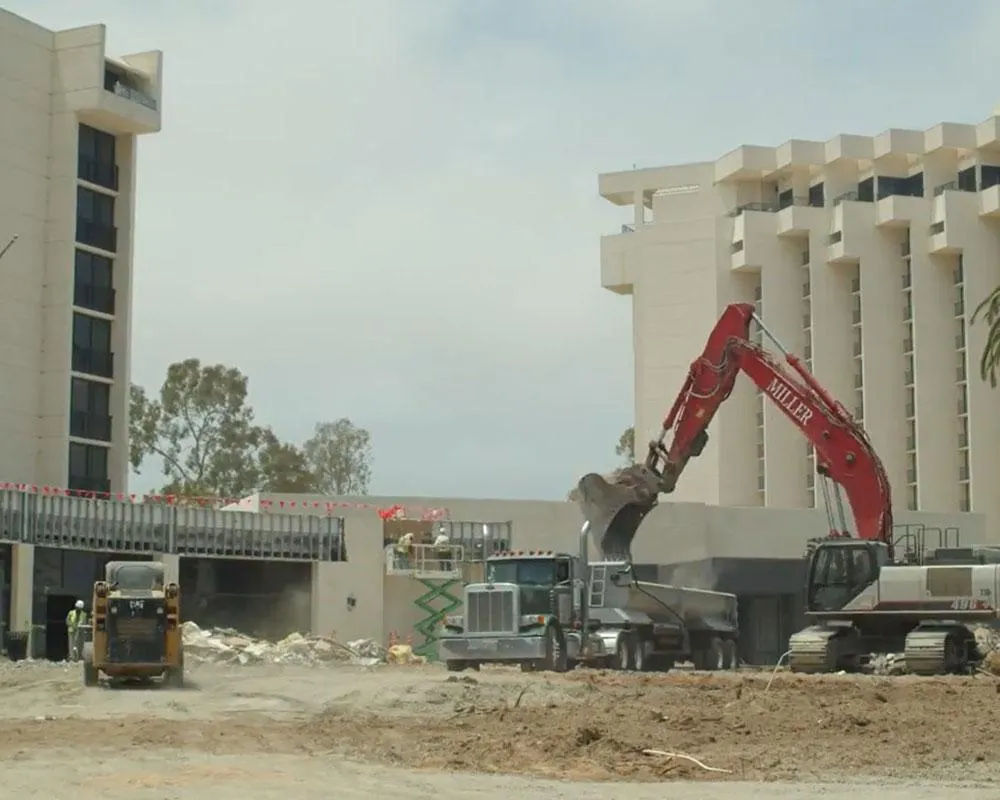
Serving Wisconsin Counties: Marathon, Oneida, Villas and Lincoln Counties
Site Preparation near Marathon County, Wisconsin
Knauf Excavating LLC is Committed to superior quality and results!

AVOID COSTLY MISTAKES:
Do NOT hire an excavating contractor without first reading our free guide:
The ULTIMATE Excavation & Septic "Success Guide."

Understanding Site Preparation near Marathon County, Wisconsin
Before any foundation is poured or a driveway is set, the ground must be ready. Site preparation is the disciplined, start-to-finish process of transforming raw land into a build-ready surface that meets code, design specs, and safety standards. In Marathon County, Wisconsin, that means planning for clay soils, freeze–thaw cycles, spring moisture, and local drainage patterns. A thorough approach prevents costly rework, protects structures, and accelerates schedules.
How Can We Help?


What Site Preparation near Marathon County Typically Includes
Every parcel is different, but core tasks share the same goals: safety, stability, and long-term performance. A comprehensive scope often covers:
Permitting guidance and coordination with local jurisdictions.
Land and brush clearing, tree removals, and stump grinding.
Selective demolition and debris disposal.
Rough and fine grading to achieve plan elevations and drainage.
Soil testing, compaction, and proof-rolls to verify bearing capacity.
Importing structural fill or exporting unsuitable material.
Erosion and sediment control, silt fence, and inlet protection.
Utility trenching for water, sewer, electric, and telecom.
Driveway or construction entrance stabilization with aggregate.
Temporary access, safety fencing, and traffic control.
Final stabilization with seed, mulch, or riprap where needed.
The Benefits of Professional Site Preparation in Wisconsin
Quality site work pays dividends throughout the life of a property. Key advantages include:
Structural reliability: Proper grading and compaction reduce settlement, slab cracking, and frost heave.
Water management: Engineered slopes and drainage paths move water away from foundations and septic fields.
Faster construction: Crews can mobilize sooner when the pad is level, compacted, and inspection-ready.
Lower lifetime costs: Correct subgrade preparation means pavements, walls, and utilities last longer.
Environmental compliance: Erosion controls protect streams and neighboring parcels during storms.
Safety: Clean access, stable work zones, and utility markouts minimize incidents.
Resale value: A property with proven drainage and stable soils shows better during appraisal.
Benefits of Hiring a Local Expert for Site Preparation near Marathon County, Wisconsin
Working with a nearby specialist adds practical knowledge that generic plans cannot deliver. Here is why local matters:
Familiarity with municipal standards in Wausau, Weston, Mosinee, and rural townships.
Experience with seasonal timing, including frost laws and spring road weight limits.
Knowledge of local aggregate sources, haul distances, and disposal sites to control costs.
Relationships with surveyors, geotechs, and inspectors to shorten turnaround times.
Understanding of septic setbacks, well separations, and utility corridors is common across Wisconsin.
Rapid response for weather events or change orders that affect schedules.
See Our Excavation & Septic Services

✔️ Commercial Excavation
✔️ Residential Excavation
✔️ Swimming Pool Excavation
✔️ Basement Digging
✔️ Basement Backfill
✔️ Shoreline Restoration
✔️ Driveway Construction
✔️ Municipal Excavating
✔️ Snow Plowing Service
✔️ Demolition
✔️ Large Pond Construction
✔️ Small Pond Construction
✔️ Dozer Work
✔️ Septic Inspections
✔️ Septic System Pumping
✔️ Septic Installs Traditional Systems
✔️ Septic Tanks - Aerobic Systems
Quality Services Launched FAST!

✔️ Septic Tanks - Plastic/Poly
✔️ Septic Tanks - Concrete
✔️ Drain Field Replacement
✔️ Forestry Mulching
✔️ Grading, Lot Clearing
✔️ Retaining Walls
✔️ Sewer Repairs
✔️ Drainage Systems
✔️ Concrete Flatwork
✔️Driveways, Sidewalk, Foundations
✔️ Foundation Repairs
✔️ Full Site Preparation
✔️ Trenching
✔️ Utilities Trenching
✔️ Grade Shed Pad
✔️ Site Construction
What Are You Waiting For?
Step-By-Step Process for Hiring a Site Preparation near Marathon County Provider
Use this practical, transparent roadmap to move from idea to groundbreak:
Define the project: House, pole barn, addition, commercial pad, or driveway upgrade. Gather drawings, soil info, and desired start date.
Initial call: Share your goals, constraints, and photos. Ask about similar local projects and available windows in the schedule.
Site walk: Meet on-site to review access points, trees to save, drainage concerns, and stockpile locations.
Scope and estimate: Expect a written breakdown listing clearing, cut/fill volumes, compaction standards, erosion controls, utility trenching, and restoration.
Due diligence: Verify insurance, licensing, references, and safety record. Review change-order policy and daily communication practices.
Contract and permitting: Lock scope, unit prices, and milestones. Confirm who pulls permits and calls for locates.
Mobilization: Establish construction entrance, silt fence, and staging. Mark utilities and set grade benchmarks.
Execution: Clearing, rough grade, compaction, utility runs, proof-rolls, and fine grade. Inspections occur at key stages.
Quality checks: Density tests, slope verification, and drainage confirmations before foundations or pavements proceed.
Closeout: Final cleanup, seed and mulch, as-built updates, and a walkthrough to confirm you are build-ready.
How Costs Are Built for Site Preparation near Marathon County, Wisconsin
Transparent pricing helps you compare apples to apples. Typical cost drivers include:
Site access, haul distance, and traffic control needs.
Clearing density, tree diameter, and stump counts.
Soil type, groundwater, and the amount of undercut required.
Import or export volumes and material specifications.
Compaction targets, geotextiles, and proof-roll requirements.
Erosion control measures sized for Wisconsin rainfall events.
Utility trench depth, bedding, and number of crossings.
Weather contingencies and winter protection.
Timeline Expectations in Wisconsin’s Climate
Timelines hinge on weather, permitting, and material availability. A small residential pad may take a few days, while multi-acre sites can run several weeks. Building during late spring through fall typically offers the most predictable progress. Winter work is possible with frost removal, heaters, or insulation blankets, but those steps add cost and coordination.
How to Evaluate Proposals for Site Preparation near Marathon County
Look for clarity and measurable standards. Strong proposals will:
Cite grading tolerances, compaction percentages, and test methods.
Separate line items for clearing, excavation, utilities, and restoration.
Identify responsible parties for permits, locates, and inspections.
Describe erosion control devices and maintenance plans.
Outline communication cadence, daily reports, and change tracking.
Local Codes and Permits for Site Preparation near Marathon County
Projects move faster when permitting is mapped out early. Coordinate with zoning and highway departments to approve access, erosion controls, and approaches. Confirm utility locates and septic setbacks. Specify compaction tests, proof-rolls, and slope tolerances. Clear submittals and documentation keep inspectors aligned, reduce rework, and help you hit the schedule without costly surprises.
Hours: Mon-Fri 7AM-5PM
Extended hours by appointment only.
Address: 1250 W. Campus Dr. Wausau, Wisconsin 54401
All rights reserved | Client Support Area